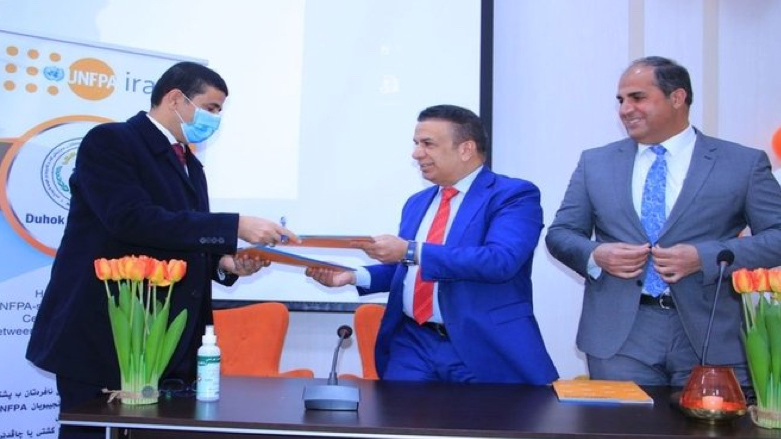UNFPA hands over 11 women centers in Duhok to KRG Directorate

ERBIL (Kurdistan 24) – The United Nations Population Fund (UNFPA) and its partner Harikar Organisation handed over 11 Women Community Centers to the Directorate of Labour and Social Affairs in Duhok on Sunday.
The Women Community Centres were established by UNFPA in 2014 amid the humanitarian crisis caused by the ISIS war, the UNFPA said in a press release.
The centers, which provided psychosocial support, case management, life skills activities, and awareness sessions to women and girls, were located in 11 camps for refugees and internally displaced persons.
"We are happy to take on these centers to help the women and girls in our community. I thank UNFPA for their partnership and for the ongoing building and strengthening of the capacity of the Directorate's staff," Dr. Sherzad Hamed, Director General of the Labour and Social Affairs in Duhok, said during the event, the UNFPA said in a press release.
"Our collaboration will ensure we maintain good quality services to all women and girls requiring assistance at these Women Community Centres," said Deputy Representative of UNFPA in Iraq Himyar Abdulmoghni.
"The importance of transitioning these centers from NGO's (Non-Governmental Organisation) management to the Government is to ensure sustainability of the confidential multi-sectoral response and services, including medical, psychosocial and legal services for GBV survivors and confirm the government accountability to the most vulnerable women and girls."
Salwa Moussa, a UNFPA spokesperson, told Kurdistan 24 that following the national priority of transiting from humanitarian response to the development, the “UNFPA supports the Government of KRI (Kurdistan Region of Iraq) to strengthen health and social protection sectors to provide sustainable services for women in need, especially those affected by the humanitarian crisis.”
“Earlier this year, UNFPA started implementing a transition strategy focused on GBV prevention and services. The strategy aims to hand over centers currently supported by UNFPA to the Government authorities,” Moussa said.
She added that the transition process includes technical and management capacity building of the Ministry of Labour and Social Affairs of KRI (Kurdistan Region of Iraq) and its regional entities to support and advance services to women and girls provided by the Women Community Centres.
“This approach will ensure a more sustainable, appropriate, and transformative response to the needs of women and girls survivors of GBV (Gender-Based Violence), whether in camps or the host communities,” she said.
Moreover, she added that the transition will be done in phases to ensure that the services remain accessible and of the same quality.
“During the first phase, UNFPA will continue supporting the essential running costs of the centers while building the capacity of MOLSA and DOLSA staff,” she said.
“For the longer term, the services will be transferred entirely under the Government management, including funding as part of the Government’s National Action Plan and its commitment to the SDGs (Sustainable Development Goals).”
